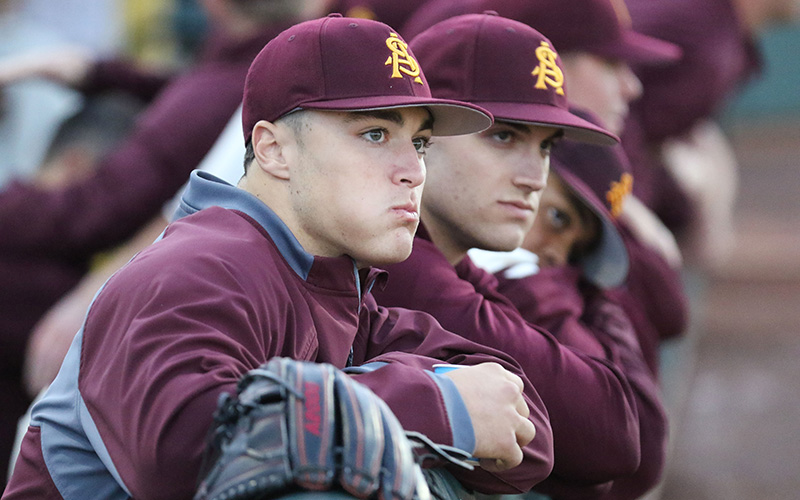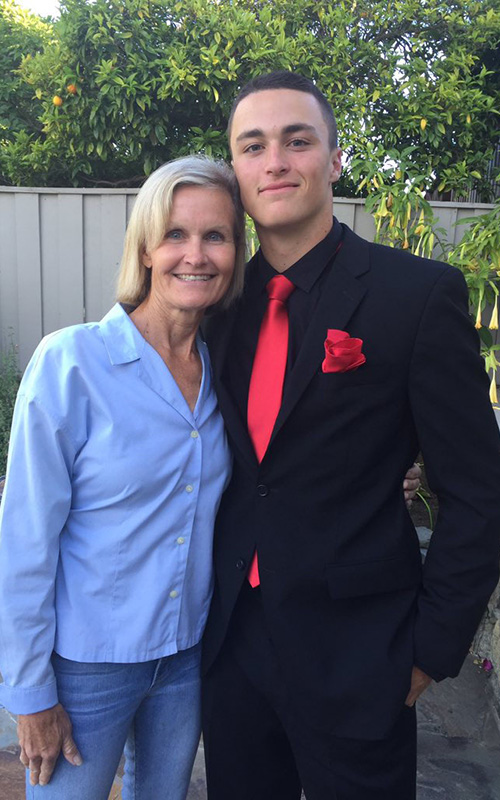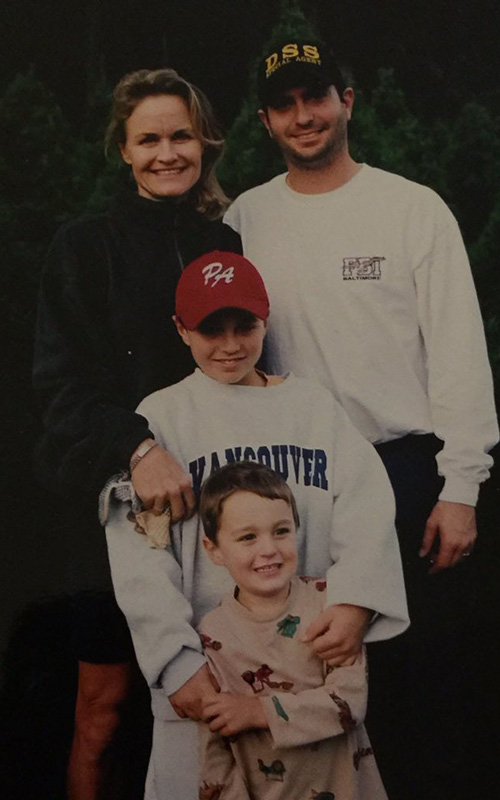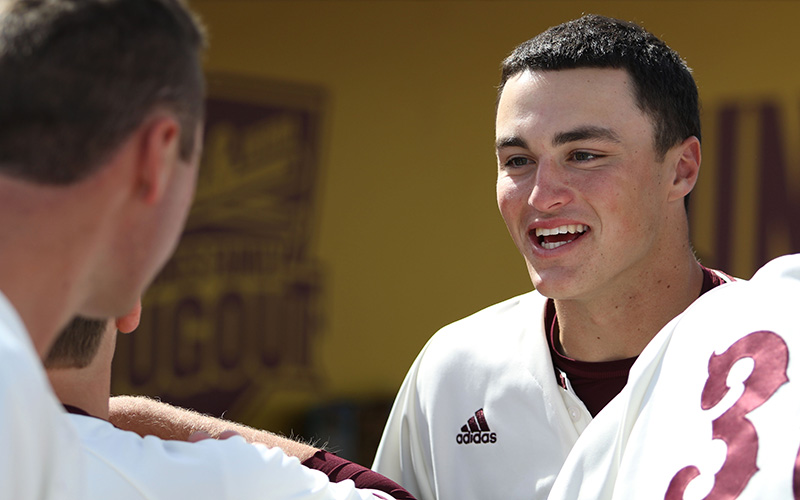PHOENIX – Hunter Bishop leans up against the railing of the dugout at Phoenix Municipal Stadium, sunflower seeds stuffing his mouth. Every part of him – except for maybe his slender 6-foot-5 frame – looks the part of an ordinary Division I baseball player. However, there’s more to the Arizona State freshman outfielder.
He has “4MOM” inscribed on the back of his baseball cap, a nod to a foundation his older brother Braden created and a reminder to the younger Bishop about something his mother, Suzy, is going through.
For Bishop, baseball is a passion but family is his life.
“That’s the biggest thing to me,” Bishop said. “You know, everything else could fail, but my family is my No. 1 priority.”
The importance of family was hammered home during his junior year of high school when his parents sat 16-year-old Hunter down and delivered devastating news: Suzy Bishop had been diagnosed with early-onset Alzheimer’s disease.

Arizona State’s Hunter Bishop, front, spits sunflower seeds during a game against New Mexico State, Tuesday, Feb. 28, 2017 at Phoenix Municipal Stadium in Phoenix. (Photo by Fabian Ardaya/Cronkite News)
A Phone Call
Hunter made a quick phone call to Braden, who was then a junior outfielder at the University of Washington.
“I didn’t really know what was happening, but I just remember coming home one day and they sat me down on the couch and told me,” Hunter said. “At first, I didn’t really think it was that big of a deal, didn’t really know what it meant, but then obviously researching it and seeing how it’s progressed, it’s become a lot worse.
“I remember calling my brother about it and that’s when it kind of hit me, and me and him kind of broke down.”
The phone conversations continued, coming more and more often as the two brothers tried to cope with their mother’s disease. The brothers rekindled a bond that had changed when Braden went to Washington.
Hunter, despite being around his parents every day, tried to sort it all out.

Suzy (left) and Hunter (right) Bishop pose for a photo. (Photo courtesy of Hunter Bishop)
“He doesn’t know what any of this means,” said Braden, now a top prospect in the Seattle Mariners organization. “He doesn’t know what Alzheimer’s is. It was pretty tough on him, so it’s good that he used me as an outlet.”
The news complicated Hunter’s senior year of high school. Beyond the normal decisions that face a teenager – going to prom, graduating, figuring out where to go to college, playing multiple sports – he had to watch his mom’s deteriorating condition.
Outside of experiencing migraines, Suzy had shown no real symptoms that would indicate Alzheimer’s. A test for the Alzheimer’s gene was negative. Yet, she was eventually diagnosed with the early-onset version of the disease.
For most, symptoms of Alzheimer’s begin to show when they are in their mid-60s. Suzy is one of the approximately 200,000 Americans to experience symptoms earlier than that. She was diagnosed at 54.
While estimates of how many are affected vary, the Alzheimer’s Foundation of America says as many as 5.1 million Americans might have the disease.
Symptoms can include impaired thought, impaired speech and confusion, according to Alzheimer’s Greater Los Angeles. Hunter witnessed one of the most devastating symptoms that year.
“He saw it every day,” Randy Bishop said of his son. “He was the victim of – and I hate to use this term, but — verbal abuse. When you go through Alzheimer’s, the patients can get very agitated. They think you do things that you don’t. There were many times where Hunter was the brunt of this yelling and lashing out or blame. Again, it’s nothing new. That’s what people go through.
“Hunter dealt with that, and had to go through it, and Braden didn’t. Hunter was there for that last year. I would say it’s really nice that Hunter is away from home right now. Both boys come home as much as they can, but it’s nice that he’s now removed from the decline, really.”
Suzy struggled to come to grips with it herself, Randy said.
“At first, she was very against anyone knowing anything,” he said. “She didn’t want people to feel badly for her. She’s never been that type of person to feel sorry for herself or make anyone else feel that way.”
Randy said he is cautious with how he approaches updating his sons on their mother’s status, particularly with Hunter. He said he doesn’t want to allow outside factors to play into each of their athletic and academic careers, but admits it’s hard to keep a lid on it.
“In a sense, I want to protect them,” Randy said.
Hollywood
Suzy spent most of her life working with scripts. She never could have imagined how her own would be written.
As vice president of production at NBC, she played a critical role in creating the famed “Law and Order” series and shows like “Homicide: Life on the Street.” She did work on television movies and earned an Emmy for the film “Separate But Equal.”
She met Randy through the entertainment industry. She was working as a production assistant for Randy’s father – then a producer at Universal Studios. When Randy came to work for his dad after injuries derailed his own baseball career, Randy and Suzy clicked.
They’ve been together ever since, a love affair that has lasted more than 30 years.
Randy would go into law enforcement in roles ranging from police officer, to detective, to running security for the San Jose Sharks. Eventually, he started his own private investigation firm in San Francisco.
Suzy’s work took her around the world, but she made sure her family was close, even if that meant taking her boys out of the country.
When she took a job as the head of the Vancouver Film School in British Columbia, she moved the family to Canada for a time.
“She traveled, took them to Canada, took them to London, took them to the Czech Republic,” Randy said. “I mean, they were all over the place. Prague. They traveled a lot as little kids, and they were always on movie sets.

Suzy (back left), Randy (back right), Braden (center) and Hunter Bishop (front) pose for a photo. (Photo courtesy of Hunter Bishop)
“We always had people to take care of them when she was working 15-, 16-, 17-hour days. It really was about family. Going to Vancouver was no big deal for them, so we thought it would be a great experience for them to live in another country.”
Even as their mother gained accolades, Randy made sure Braden and Hunter remained humble. The values that Randy and Suzy instilled in their boys would come in handy as their athletic careers blossomed.
The most important thing, Randy said, was to make the boys don’t lose sight of how rare their gifts and opportunities are.
“It really has brought them full circle to see the successes that their mom has had in her industry, winning an Emmy award and other things in producing, and then seeing how quickly it can be lost,” Randy said. “Yet, we never lost sight of what was important. It was all about treating people the right way.”
A Family Field
Sports have provided an escape, but Braden and Hunter would have been competing regardless. Braden has never lost to his brother in any sort of athletic competition, or so he claims.
Hunter, ever the competitor, insisted that claim is false. However, he also can’t recall exactly when he’s beaten Braden at something and admits his winning percentage isn’t great.
“I didn’t win a whole lot,” he said.
Even as Randy and Suzy insisted that Braden ease up on his younger brother, he pushed Hunter harder.
“The more we said, Give him a little,’ the more he would just say, ‘Absolutely not,’ ” Randy said. “That just was the dynamic of it, and it actually made Hunter a lot more gritty and it made him feel like he had to have thick skin to get through. It helped.”
Hunter may get the last laugh, though. After all, he is now 4 inches taller than Braden, and outweighs him.
Sports worked as a bond for all of the Bishops. Lacrosse, baseball, football, even volleyball or water polo – Randy or Suzy would be there to support their sons.

Arizona State’s Hunter Bishop, center, takes the field for a game against Northwestern, Friday, Feb. 17, 2017 at Phoenix Municipal Stadium in Phoenix. (Photo by Fabian Ardaya/Cronkite News)
Randy recalled winters in Vancouver when Braden and Hunter would go to the park and he would hit them baseballs, even in the snow.
“We’d call them divers, and they’d have to get so many divers,” Randy said. “It didn’t matter if it was pouring or snowing. We were out there doing it.”
Suzy’s movie and television career didn’t halt her involvement in her son’s activities. Often, it was Suzy who drove them to their games. And she is as responsible for their athletic gifts as Randy.
In fact, Suzy, who was a track star at UCLA, was arguably the best athlete in the family.
She also may have been the first to sense something special in Braden and Hunter. Each day, she’d toss Wiffle Balls to her boys for them to hit. Once, Randy came home and saw his wife with welts on her neck and face.
Braden’s batted Wiffle Balls had done the damage.
He’s still doing damage as as a prospect in the the Seattle Mariners organization after being taken in the third round of the 2015 MLB draft.
Hunter was selected out of high school in the 24th round of the 2016 draft by the Padres, but turned them down, along with a walk-on spot to play football at Washington, in order to play baseball at Arizona State.
4MOM
When he first found out about his mother’s diagnosis, Braden wasn’t sure how to react.
“I was pretty down and out when I found out,” he said.
Washington’s strength coach Dave Rak had an idea that he hoped would help.
If Braden couldn’t be home, he had to do something. Rak suggested Braden put together a deadlifting event for him and his teammates in order to generate Alzheimer’s awareness.
First, Braden and Rak needed to make sure Suzy would be comfortable sharing about her condition. She didn’t want to be the center of attention but eventually agreed.
With a $5 entry fee to the event and a $20 charge to compete, the event generated a big response. There were about 200 people who signed up.
“We had so many people come out and actually support it, and also my mom was able to be there and see that so many people supported her,” Braden said. “It wasn’t just her by herself. She didn’t have to hide it. I think it was huge for us.”
During fall scrimmages, Braden began writing “4MOM” on his forearm as a tribute to his mother and to spread Alzheimer’s awareness. Washington and the University of Arizona even declared a “4MOM” day when the Huskies played in Tucson on Mother’s Day.
“I wrote it on my arm just to kind of remind me and give me a perspective that baseball really isn’t that important when it comes down to it,” Braden said. “There’s a lot more going on outside the lines that really brings a perspective of failure and all that stuff. It doesn’t matter, because there’s a lot worse outside.”

Arizona State’s Hunter Bishop interacts with a teammate during a game against Northwestern, Friday, Feb. 17, 2017 at Phoenix Municipal Stadium in Phoenix.(Photo by Fabian Ardaya/Cronkite News)
For that Mother’s Day game, each player had “4MOM” written somewhere on them. The ensuing media coverage turned a small local effort into a full-blown foundation, which has now partnered with Alzheimer’s Greater Los Angeles, the second-largest foundation for the disease in the nation.
“We’ve redesigned our logo and started to get apparel out there and we have so much more notoriety now because another outlet wanted to pick us up and help us out,” Braden said.
Braden’s work has continued even during a professional baseball season, giving him a platform to spread the word.
“The higher you get in baseball, obviously, the more people are going to know who you are, the more news outlets are going to pick you up, because it is a story,” Braden said. “I think that helps a lot, having a guy in the Pac-12 and one of us playing professionally. I think it really, really helps.”
It’s clear that “4MOM” has come with Hunter to Arizona State. Several teammates have “4MOM” written on their caps, too.
There are plans for a “4MOM” day at Phoenix Municipal Stadium, where the Sun Devils play. ASU recruiting coordinator and third base coach Ben Greenspan said the school is currently in talks with Adidas about having special apparel available that day.
“We’re working towards something,” ASU head coach Tracy Smith said. “He had brought that to my attention and there’s some other outside components that will come out. You know, we want to do something to be proactive in that and probably a little bit more broad than even what was done at Washington.”
Meanwhile, with help of some of her friends in the movie industry, Suzy is contributing to a documentary about her experiences over the past year and a half.
“It means a lot to her, that much I know,” Randy said. “I’m sure that when it’s finished it will be pretty special.”
Away from home
The distance between Junípero Serra High School in San Mateo, California, and Phoenix Municipal Stadium is 746 miles.
That’s about as far away from his family as Hunter Bishop could stand to be when choosing where to go to college. The distance is just enough to be able to remove himself from everything when necessary, but also close enough to be home in a moment’s notice.
Randy said he wants Hunter to have a freshman experience that is as normal as possible. He and Smith converse frequently about Hunter, they said.
“That was the commitment that I had made to Randy in this whole process because of the situation with his mother,” Smith said. “My wife, Jamie, is very involved in our baseball program. This is a unique circumstance.”
Smith said he keeps an eye on Hunter, not because of his baseball potential but because of the stress he is under.
“I know I left and I went four hours away to go to college, and all I’m dealing with is being away from my home for the first time in my life,” Smith said. “But being away from home in addition to not knowing what’s going on with your mother from day to day (is difficult). So, I think we have to be very aware of that and not afraid to talk about it.”
Hunter Bishop, the baseball player, will be defined by his accomplishments on the field. Even as just a freshman, he has made it clear that success in baseball is not his lone goal.
Hunter Bishop, the person, hopes to make a difference in the world. His mother’s disease is cruel, he said, and the experience is something he will continue to carry with him, whether he fulfills his immense athletic potential or not.
“I think the biggest message would be that, it’s life, and things happen in life,” Hunter said. “I’ve said it a couple times, you’ve just got to roll with the punches and I think that’s what me and my brother always say. People are going to be here for you. This disease is not a good one at all.”
For more information on “4MOM”, check out their website or follow them on Twitter at @4MOM_ALZ.